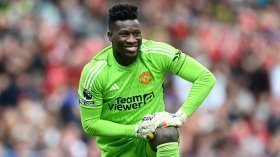Manchester United’s Andre Onana reportedly requested a pay rise after a poor season, causing friction with manager Ruben Amorim. This may be linked to his reduced role, with Altay Bayindir starting Premier League games and Senne Lammens’ arrival adding competition.
Andre Onana, the Manchester United goalkeeper, reportedly ruffled feathers at the club this summer by requesting a pay rise shortly after his return, according to reports from The Athletic. The request has allegedly created tension within the club, particularly with manager Ruben Amorim, and may be linked to Onana's reduced role at the start of the current season. This revelation comes after a challenging 2024/25 campaign for the Cameroonian international, where he was criticized for several errors that led directly to goals.
Onana's first season at Old Trafford was far from smooth sailing. Acquired with high expectations to replace David de Gea, Onana's performances were often scrutinized, and he faced criticism for some high-profile mistakes. While his shot-stopping ability was generally solid, errors in distribution and decision-making led to significant goals conceded. This inconsistency raised questions about his long-term suitability for the club, leading to speculation about a potential departure during the transfer window. Despite the rumors, Onana remained firm in his desire to stay and fight for his place in the team.
The request for a pay rise, however, adds a new layer of complexity to the situation. It's unclear why Onana felt entitled to ask for increased wages after a season marred by errors and criticism. Such a request might have been perceived as insensitive, especially given the club's overall performance and financial constraints. It is believed that this request didn't sit well with Amorim, who took over managerial duties at the start of the season.
The consequence of Onana's request appears to be a diminished role in the team. Altay Bayindir, another goalkeeper in the squad, has been preferred in all three Premier League games this season, while Onana's only appearance came in the second round of the Carabao Cup against Grimsby Town. This limited game time suggests that Amorim is not entirely convinced by Onana's attitude or performance. The signing of Senne Lammens on deadline day further complicates Onana's future at the club. Lammens' arrival provides additional competition in the goalkeeping department, raising the possibility that Onana could find himself completely out of contention for a starting spot.
The situation highlights the delicate balance of power and influence within a football club. Players, managers, and executives often have differing agendas, and conflicts can arise when those agendas clash. In this case, Onana's desire for a pay rise appears to be at odds with the club's assessment of his performance and value. The outcome of this situation remains uncertain, but it's clear that Onana faces an uphill battle to regain his place in the Manchester United starting lineup. He will need to demonstrate a renewed commitment to the team, improve his performances on the pitch, and mend fences with Amorim if he hopes to revive his career at Old Trafford.
The next few months will be crucial for Onana. He needs to seize any opportunities he gets to impress the manager and prove his worth to the team. The pressure is on him to turn things around and silence the critics who have questioned his ability and attitude. Whether he can rise to the challenge remains to be seen, but one thing is certain: the situation at Manchester United is far from resolved, and the goalkeeping position will continue to be a source of intrigue and speculation in the weeks and months to come. The fans will be closely watching to see if Onana can regain his form and prove that he deserves to be the number one choice between the posts for the Red Devils.
